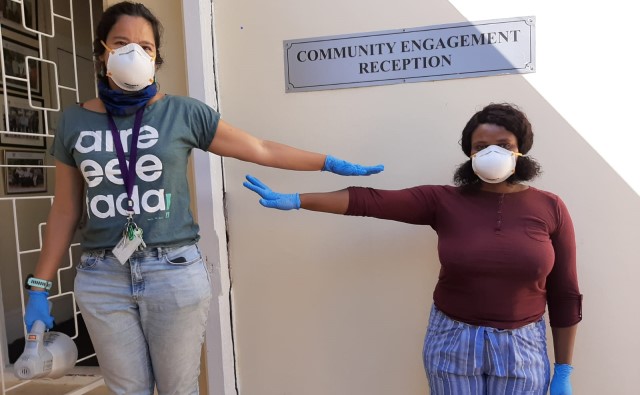
In a campaign they are calling Gxotha i Covid-19 (‘Chase Covid-19 away’), Rhodes University’s Community Engagement (RUCE) Division has been at the epicentre of collaborative efforts to raise awareness about the outbreak of Covid-19.
As soon as the first case of Covid-19 in South Africa was announced on 5 March 2020, Director of RUCE, Diana Hornby, and her team sprang into action to develop material, methods and messaging to distribute critical information with the Makhanda community.
“We first designed posters with accurate information regarding what Covid-19 is, how it is spread and how to stay safe using preventive methods, which included key contact numbers. We made sure to have both English and isiXhosa versions,” explained Hornby. They also made short videos that showed prevention methods such as washing hands for 20 seconds, debunked myths and included other safety tips.
The posters and videos are regularly shared on the Division’s social media platforms, and over 1000 posters have also been put up in key community spaces such as clinics, grocery stores and converted into pamphlets to hand out to citizens.
“We have spent several days in the field targeting social grant beneficiaries (old age, disability and child grant) during collection days, where we handed out over 4000 pamphlets and spoke to people standing in the long queues. This was very productive because as people waited to collect their grants, having something to read in their home language was a welcome distraction,” Hornby said.
RUCE has also created WhatsApp groups to keep community partners and programme beneficiaries informed on-the-go. To ensure no one was left out of the loop, RUCE also personally visited Community Partner Organisations to talk about Covid-19.
“We also had a team of science postgraduate students visit the game reserve, Amakhala, as soon as it became evident that Covid-19 had started to spread in our Province due to European tourists visiting our wild animal reserves,” she explained.
More recently, RUCE partnered with Rhodes University’s Covid-19 Science Engagement Team and Makhanda’s local newspaper, Grocott’s Mail, to produce 5000 copies of a four-page isiXhosa supplement, which was distributed to communities over the weekend. This initiative went hand-in-hand with a collaborative mask-making drive between Rhodes University’s Housekeeping Staff and other mask-making citizens, which were distributed to people in the front line such as petrol attendants, hawkers and social workers.
According to Hornby, since one of the key purposes of a university is the production an dissemination of knowledge, RUCE felt it was pertinent to jump into action as soon as possible to stop the spread of not only the virus, but misinformation about the virus.
“We have had a very good reaction from communities, who had a lot of questions and were happy to get accurate information, especially since misinformation has become such an issue,” Hornby explained. “We have a team of Rhodes University scientists, led by Professor Janice Limpson, who supplyi accurate information based on research and who also verify the accuracy of information. This allows us to provide Makhanda (and other) communities with authentic information that can help them make informed daily decisions at this difficult time.”
But what has been most encouraging to see, said Hornby, is how Makhanda’s people have all found ways to contribute to dealing with this crisis. “Many different divisions at Rhodes University, that don’t normally work closely together, have stepped up and shared their expertise – from knowledge to practical skills. The other citizens of Makhanda have also been finding creative ways to contribute,” she said. “I find myself looking beyond this crisis and become quite excited by what can become of our beloved city with all the passion, action and leadership that has been demonstrated in the past few weeks.”
